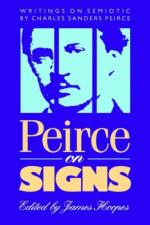|
This section contains 7,041 words (approx. 24 pages at 300 words per page) |

|
SOURCE: "Meaning as Habit: Some Systematic Implications of Peirce's Pragmatism," in The Monist, Vol. 65, No. 2, April, 1982, pp. 230-45.
In the following excerpt, Rosenthal concludes that Peirce's pragmatism is founded on sound ontological and epistemological thinking.
Peirce's pragmatic stress on meaning in terms of habits of response is, of course, well known.1 However, the language in which it is usually expressed tends too often to conflate its epistemic and ontological dimensions,2 thereby hiding from view its full systematic significance. The following discussion will focus on the emergence of such meanings as epistemic relational structures which embody the characteristics of the dynamics of organism-environment interaction in their very internal structure and which lead outward toward the universe, providing an experienced content which is at once epistemic and ontological.
For Peirce, meanings are to be understood as logical structures,3 not as psychological or biological facts. Peirce does not want to give...
|
This section contains 7,041 words (approx. 24 pages at 300 words per page) |

|


